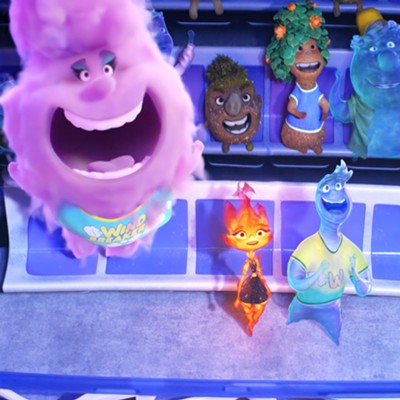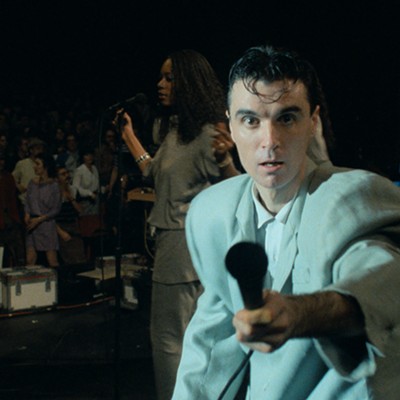Ever since its super-earnest, awards bait-y trailer dropped online in October, Hillbilly Elegy has elicited the kinds of responses you'd expect from a Yelp review of a restaurant that gave the writer food poisoning. The Atlantic knocked it as one of the worst movies of the year, while Vox critic Alissa Wilkinson went even further, proclaiming it as "one of the worst movies I've seen in years."
So, now that the movie is finally streaming on Netflix for all to see, how bad is it really? Turns out, it's pretty bad.
The movie is well-intentioned, I think, but it's a real howler, a MAD Magazine version of a serious drama, the sort that tries to tackle a number of deeply complex issues — domestic abuse, drug addiction, economic displacement — through the sort of flashy performances and heart-tugging monologues we've seen in a million made-for-TV dramas.
You probably know that it's based on a memoir/cultural dissertation by one J.D. Vance, unread by me, which sparked countless think pieces in the thick of the 2016 presidential election. From what I can gather, it is Vance's reflection on his difficult upbringing in Middletown, Ohio, a once-thriving steel town where most of his counterparts stay put and live in abject poverty. Vance himself was raised by a single mother, Bev (played in the film by Amy Adams), who was always bouncing between boyfriends and struggling with drug addiction, and by his tough-as-nails Mamaw (Glenn Close), who has her own history of abuse and neglect.
Vance managed to "escape" Middletown, enlisting in the Marines and earning a law degree from Yale on his way to a venture capital gig under Peter Thiel. Ah, the American dream! The script, adapted by The Shape of Water's Vanessa Taylor, vacillates between two timelines: Young J.D. (Owen Asztalos) contending with Bev's intensifying opioid addiction, which she picked up while working as a nurse, and later returning to Middletown as an adult (Gabriel Basso) when she relapses, this time with heroin.
If Hillbilly Elegy deserves plaudits, it's in the acting department. The performances here are technically impressive, particularly Adams' and Close's, and they practically beg to have a "for your consideration" chyron burned at the bottom of the screen. They will no doubt receive the awards accolades they signed up for, but their work is a bit too show-offy for my taste. I think the best work in the film comes courtesy of Haley Bennett as J.D.'s sister Lindsay, because she conveys the same struggles without the benefit of histrionics and speechifying.
Hillbilly Elegy was directed by Ron Howard, whose filmography is a string of titles that inspire such burning questions as, "Wait, Ron Howard directed that?" He has made his share of good-to-great middlebrow dramas, but this is not one of them. Save for the near-constant (and no doubt accurate) barrage of expletives that pepper the dialogue, a lot of the film plays out like one of those low-budget, Christian-friendly ClearFlix movies. He also renders some emotionally harrowing scenes — Bev having a mental breakdown in the street, or Mamaw lighting her deadbeat husband on fire — in torturous slo-mo, as if stretching out the torture somehow makes it more intense. (It doesn't.)
Pundits like Ben Shapiro and David Brooks, ever the arbiters of egalitarianism, have blamed the film's lukewarm reception on haughty liberal writers' inherent rejection of the conservative trappings of its source material. But this turns out to be — no surprise — a specious argument (the most negative reviews I've seen are from critics who grew up in the region where the film is set), because to consider the politics of Hillbilly Elegy would have required the film to consider its own politics, which it does not do. (Would you expect anything less from noted political firebrand Ron Howard?) Save for passing mentions to Monica Lewinsky and Al Gore, the movie sands down all of the sharp but complicated sociopolitical edges that made Vance's book so buzzworthy in the lead-up to the 2016 election, which is fine by me, but the human drama we're left with simply isn't compelling.
But I'm going to blame Vance, anyway — not as an author, but as an executive producer. This film is less a paean to hardscrabble Appalachians than it is a self-imposed tribute to the sheer virtuosity of J.D. Vance. He's portrayed as the greatest, most gracious guy on God's green earth: The first time we see him as a teenager, he's hopping off his bike to move an injured turtle out of the road. Save for a brief adolescent outburst where he smokes some weed and commits some minor vandalism, he's squeaky clean. He is so thoroughly uncompelling in every conceivable way that the film may as well cut to white noise whenever his storyline takes over, especially in the allegedly gripping sequence where he's at a fancy dinner and can't differentiate the salad fork from the dessert fork. This is not the height of human drama, I assure you.
I have to wonder what Hillbilly Elegy might have looked like were it given to a filmmaker with actual grit — someone like Sean Baker (The Florida Project, Tangerine) or Deborah Granik (Winter's Bone, Leave No Trace), whose portraits of people on the fringes are bursting with life and drama. There are minor touches in Hillbilly Elegy that suggest a truer, more humane movie — Lindsay washing plastic silverware after a barbecue, for instance, or Mamaw watching her VHS copy of Terminator 2 for the hundredth time — but the script is a tiring series of melodramatic highs followed by crushing lows. Life can seem like that sometimes, and for the people who inspired this movie, it seems like that most of the time. But this movie doesn't really care about those people. It just wants some Oscar nominations. ♦
Rated R
Directed by Ron Howard
Starring Amy Adams, Glenn Close, Gabriel Basso, Haley Bennett
Streaming on Netflix

























